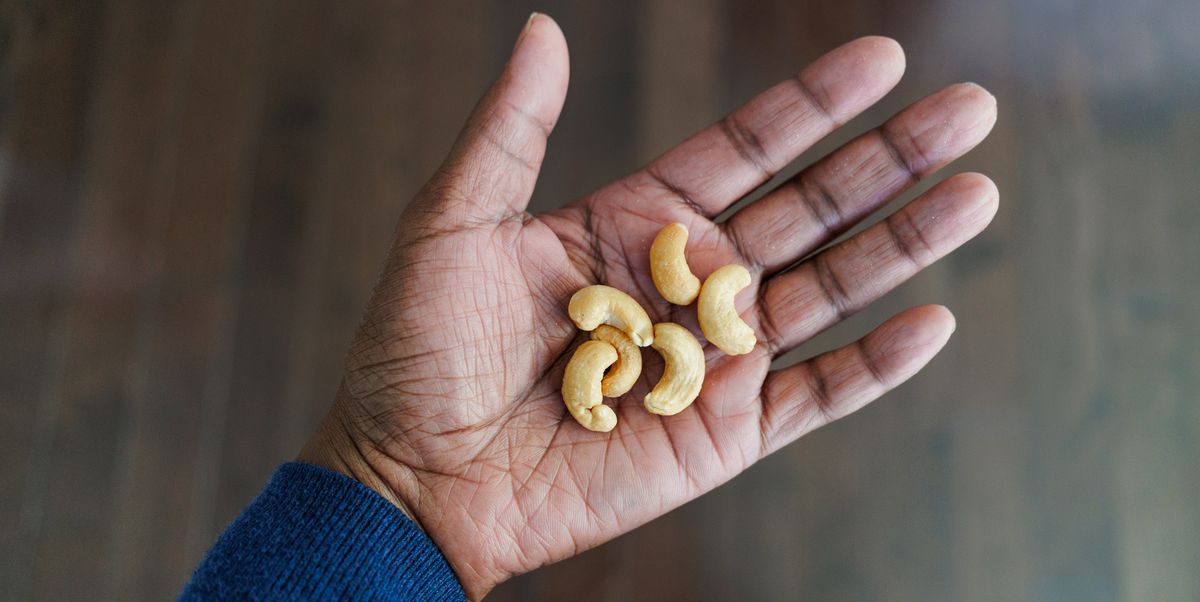Let’s be honest: There are never enough cashews in a bag of trail mix, at least to me. And that’s because they’re rich, tasty, and best of all—full of health benefits. It’s not super surprising that, like most nuts, cashews are good for you—but there’s more to them than the answer to that question. They have pros and cons, and can be added to your plate in all kinds of unique ways.
Meet the Experts: Gabriella Nowicki, M.S., R.D.N., registered dietitian-nutritionist at Rebecca Bitzer & Associates, and Alex Evink, M.S., R.D., founder of Moderately Messy R.D.
“I try to avoid labeling foods as strictly ‘good’ or ‘bad’ because nutritional needs vary from person to person,” explains Gabriella Nowicki, M.S., R.D.N., registered dietitian-nutritionist at Rebecca Bitzer & Associates. “What’s beneficial for one individual might not be suitable for another.” Still, generally speaking, they’re an ingredient to consider in a balanced diet.
Below, dietitians share everything you need to know about cashews. You’ll never look at their little half-moon shape the same way again, for the better.
Cashew nutrition
One ounce of plain, whole cashews contains the approximated following nutrition, according to the United States Department of Agriculture:
Calories: 171 caloriesProtein: 5.3 grams (g)Carbohydrates: 11 gFiber: 1.2 gFat: 11.8 g
Protein
The nuts contain a decent amount of protein per serving, which can make them a great afternoon snack to keep you from getting hangry before dinner without making you too full and ruining your meal.
Healthy fats
“Cashews are rich in both monounsaturated and polyunsaturated fats, which can help improve cholesterol levels and support heart health,” says Nowicki. Alex Evink, M.S., R.D., founder of Moderately Messy R.D. adds that this is especially important because cardiovascular disease is the number one cause of death in the United States.
Vitamins and minerals
A handful of cashews contains vitamins like B6, K, and E, as well as minerals including magnesium, copper, and zinc, explains Nowicki. “These nutrients contribute to healthy brain function, mood regulation, and the health of your skin, hair, and bones,” she says.
Cashews are actually considered one of the best nuts for their magnesium content, adds Evink. “Magnesium is important for muscle and nerve function and can help prevent stroke,” she explains. “Eating a good source of magnesium, like cashews, might even lead to better sleep.” Their zinc content may also play a role in blood sugar regulation and glucose metabolism, she adds.
Plant compounds
They also contain powerful antioxidants like polyphenols and carotenoids, “which help repair cells, reduce inflammation, and may lower the risk of chronic diseases such as cancer,” says Nowicki.
Carbs and fiber
Cashews have a decent amount of fiber, which also supports satiety and bowel movements—meaning, they can help keep you regular. Their low carb levels makes them an ideal snack for those who have diabetes or are insulin resistant, says Evink.
Cashew and weight loss
“Cashews, like other nuts, are high in healthy fats, which can help promote satiety,” says Nowicki. “This feeling of fullness may lead to reduced overall calorie intake, potentially supporting weight loss.”
This of course, is only the case if serving size is considered and portion control is practiced, Evink adds. “They are a good source of healthy fats, however, fat contains the most calories per gram. Therefore, portion size really comes into play here,” she adds. Cashews’ protein content can also help preserve lean muscle mass if you’re eating a calorie deficit diet, Evink explains.
Cashew benefits
Perhaps the best, most notable attribute to cashews is the fact that they are so nutrient-dense, meaning they provide a lot of bang for their buck, given their tiny size. “In a nutshell (ba dum, ching!), cashews are a good source of both macronutrients and micronutrients that support overall health,” says Evink. “They can help with bone health, immune support, and energy levels, among many other benefits.”
Cashew downsides
As previously mentioned, cashews, and other nuts, are fat-dense, which makes portion control important. “It’s easy to eat well beyond the recommended serving size,” Nowicki says, which is about 1 ounce or roughly 20 cashews. “Additionally, cashews are high in FODMAPs, meaning they may cause digestive discomfort, especially for those with conditions like irritable bowl syndrome. Some cashews and nut mixes contain added salt, which is something to watch for on nutrition labels. “Opt for unsalted varieties to better support a lower-sodium diet,” says Nowicki.
There’s also the fact that nut allergies are common, and therefore they may not be the most ideal snack to break out in public spaces, Evink notes.
How to enjoy cashews
When soaked in warm water, cashews can be blended into a creamy, cheese-like sauce that’s popular in plant-based cooking, says Nowicki. “They’re also a versatile addition to dishes like pasta and salads, or simply enjoyed on their own,” she adds.
Related Stories

